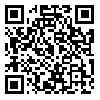Volume 7, Issue 28 (2019)
CFL 2019, 7(28): 99-121 |
Back to browse issues page
Download citation:
BibTeX | RIS | EndNote | Medlars | ProCite | Reference Manager | RefWorks
Send citation to:



BibTeX | RIS | EndNote | Medlars | ProCite | Reference Manager | RefWorks
Send citation to:
Firouzi Moghaddam M, Alavi moghaddam M. The aesthetics of rhetoric and semantic deviation in children folk literature. CFL 2019; 7 (28) :99-121
URL: http://cfl.modares.ac.ir/article-11-33848-en.html
URL: http://cfl.modares.ac.ir/article-11-33848-en.html
1- Assistant Professor of Islamic Azad University (Torbat-e Heydarieh branch) , firouzimoghaddam@gmail.com
2- Associate Professor of Persian Language and Literature, Hakim Sabzevari University,Sabzevar,Iran
2- Associate Professor of Persian Language and Literature, Hakim Sabzevari University,Sabzevar,Iran
Abstract: (5973 Views)
Due to their deviation from the principles and rules of formal written literature, nonsense are the poems driving from oral and popular literature, and are a mixture of verbal and musical games that seem to have no message. Although seemingly meaningless, nonsense are full of movement and events. The interconnected notions of nonsense and their imaginative images portray a world full of enthusiasm for children, a world without rules, like the imagination that makes up for everything it wants. In order to analyze nonsense, this study uses data collection by the library method and is based on data analysis, primarily qualitative and inductive reasoning, by examining "aesthetic rhetoric," including linguistic and syntactic deviation, synesthesia, rhythmic pattern, unusual imagination, image inversion, surreal imagery, personification, animation without any temporality and spatiality, the aesthetics of deviation even with the conflict of meaning and repetition of content. The results show that nonsense are dynamic and living poems in the field of folk literature that change and adapt to temporal and spatial conditions and that their aesthetic and semantic rhetorical traits are more expressed in linguistic structures and forms. It should be noted that the semantic deviation is their proper and inseparable character at syntagmatic and paradigmatic levels.
Article Type: پژوهشی اصیل |
Subject:
Popular child literature
Received: 2019/06/13 | Accepted: 2019/09/25 | Published: 2019/11/1
Received: 2019/06/13 | Accepted: 2019/09/25 | Published: 2019/11/1
Send email to the article author
| Rights and permissions | |
 |
This work is licensed under a Creative Commons Attribution-NonCommercial 4.0 International License. |








